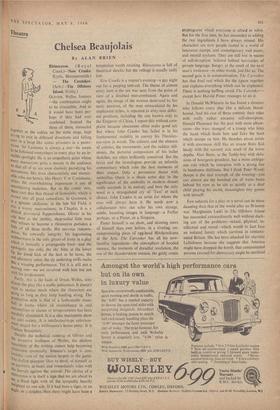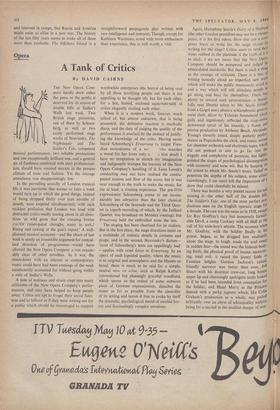Theatre
Chelsea Beaujolais
By ALAN BRIEN Rhinoceros. (Royal Court.)—New Cranks. (Lyric, Hammersmith.) — The Caretaker. (Arts.)—The Offshore Island. (Unity.) OLIVIER, Welles, Ionesco —the combination ought to be irresistible. And so it would have been per- haps if they had ever combined. Instead the three of them, manacled together at the ankles on the same stage, kept trying to exit in different directions and falling °ver in a heap like comic prisoners in a panto- mime. Sir Laurence is always a star—he seems to be followed everywhere in every play by an in- visible spotlight. He is an empathetic actor whose every mannerism jerks a muscle in the audience so that all of us are soon clumsily parodying his movements. His most characteristic and memor- able roles are heroic. like Henry V or Coriolanus, where the overwhelming impression is one of smouldering maleness. But in his comic vein; there runs that thin thread of femininity which is vv. oven into all great comedians. In Guinness, it is a spinster chilliness; in the late Sid Field, it was .a vcoozv matronliness; in Chaplin, it is a skittish provincial flapperishness. Olivier in his r°Ie here as the shabby, shop-soiled little man Who refuses to become a rhinoceros partakes a utile of all these drolls. His nervous indepen- dence, his cowardly integrity, his ingratiating stubbornness is the only gleam of irony in a play which is basically a propaganda tract—and the ia.P°10getic eye rolls, the shy bites at the lower IP' the timid kick of the heel as he turns, the st.()ft Placatory voice, the sly underdog sniffs make tms a winning performance. Yet it is still not a 111°ving one—we are involved with him but not With his predicament. „Partly, this is the fault of Orson Welles, who uirects the play like a traffic policeman. It doesn't seem to matter much where the characters are g°ing as long as they keep bustling along. The Production style is that of a fashionable music 11411 in limbo where all resemblance to real nationalities or classes or temperaments has been ,earefully eliminated. It is ,tt chic marionette show mr cafe society. It is intellectual-type entertain- Staged for a millionaire's house-party. It is -1)elsea Beaujolais. Ipespite the technical canning of Olivier and 'ne inventive liveliness of Welles, the shallow hnsubtletv of the writing cannot help becoming (wearisome eventually. lonesco's target is con- ..,,°,11M4----one of the easiest targets in the game. 'ne dullest playgoer likes to think of himself as an eccentric at heart and immediately sides with the human against the animal. The choice of a rhinoceros is in itself a sign that we are about to see. a fixed fight with all the sympathy heavily Weighted on one side. If it had been a tiger, or an eagle, or a dolphin, then there might have been a temptation worth resisting. Rhinoceros is full of theatrical shocks, but the voltage is usually sadly low.
New Cranks is a voyeur's evening—a gay night out for a peeping torn-cat. The theme of almost every item is the sex war seen from the point of view of a disabled non-combatant. Again and again, the image of the woman destroyed by her nasty passions, of the man emasculated by his unpleasant itches, is repeated in sixty-nine differ- ent positions, including the one known only to the Emperor of China. I report this without com- plaint because obsessions often make good art. But where John Cranko has failed is in his fundamental inability to convey his Thersites- eye-view in words. The colours, and the absence of colours, the movements, and the sudden still- nesses, the pictorial composition of his ballet sketches, are often brilliantly conceived. But the lyrics and the monologues provide an infantile commentary which robs the best moments of their impact. Only a percussion dance with umbrellas (there is a thesis some day in the significance of the umbrella in modern dance) really succeeds in its entirety and here the only word is a strangulated cry of 'Taxi' at each climax. John Cranko is an artist for whom the eyes will always have it. He needs now a collaborator who can echo his own strange, subtle, haunting images in language—a Feiffer perhaps, or a Pinter, or a Simpson.
Pinter himself is on show, and showing more of himself than ever before, in a riveting, un- compromising piece of egg-head Hitchcockiana at the Arts. The Caretaker has all his now- familiar ingredients—the atmosphere of hooded menace, the moments of dreadful revelation, the eve of the thunderstorm tension, the grisly comic cryptograms which everyone is afraid to solve. But for the first time, he has succeeded in adding the two ingredients I have always missed. His characters are now people rooted in a world of insurance stamps, and contemporary wall paper, and mental asylums. They are still lost in mazes of self-deception, isolated behind barricades of private language, hungry at the smell of the next man's weakness—in other words, just like us. The second gain is in communication. The Caretaker has that final reel which fits the jigsaw together and explains everything which can be explained. There is nothing baffling about The Caretaker— except how Harold Pinter manages to do it.
In Donald McWhinnie he has found a director who follows every clue like a delicate blood- hound. And his cast of three embody their roles with really rather uncanny self-absorption. Donald Pleasence has the part with most elbow- room—the wary mongrel of a tramp who bites the hand which feeds him and licks the boot which stamps on him. He thrashes about inside it with enormous skill like an insane Bisto Kid heady with the savoury sick smell of the lower depths. Alan Bates, as the Teddy-boy with delu- sions of bourgeois grandeur, has a more ambigu- ous role which he interprets with a strong line in handsome shiftiness. But I think Peter Wood- thorpe is he real triumph of the evening—you can almost see the bombed site of waste brain behind his eyes as he sits as quietly as a deaf child playing his secret, meaningless tiny games with himself.
Few subjects for a play or a novel can be more daunting than that of the world after an H-bomb war. Marghanita Laski in The Offshore Island has succeeded extraordinarily well without duck- ing any of the problems—sexual, physical, in- tellectual and. moral—which would in fact face an isolated family which survived in contami- nated Britain. She has been attacked for atavistic Leftishness because she suggests that America might have dropped the bomb, that contaminated persons rescued for democracy might be sterilised and interned in camps, that Russia and America might unite as allies in a new war. The history of the last fifty years seems to make all of these more than probable. The Offshore island is a straightforward propaganda play written with rare intelligence and restraint. Though, except for Kathleen Wardman, acted with more enthusiasm than experience, this is well worth a visit.







































 Previous page
Previous page